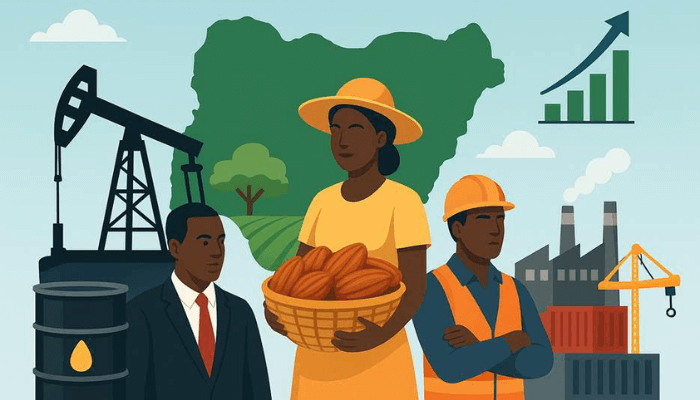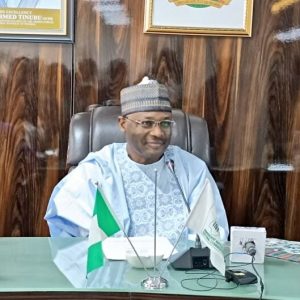For decades, every Nigerian administration has promised to “diversify the economy.” Yet crude oil, which accounts for less than 10 percent of GDP, has continued to provide the bulk of export earnings and fiscal revenues, leaving the country exposed to global oil cycles, fiscal crises, and foreign exchange shortages.
Today, however, the story is beginning to change. Agriculture and manufacturing exports are rising, non-oil trade balances are improving, and Nigerian firms are pushing into regional markets under the African Continental Free Trade Area (AfCFTA). Painful reforms, subsidy removal, currency floats, and tighter monetary policy are forcing the shift, making imports costlier and exports more competitive.
A recent policy paper by the Independent Media and Policy Initiative (IMPI), released in September 2025, frames these developments as one of the most consequential outcomes of the Tinubu reforms.

By sparking what IMPI calls “an enlarged space for participation in international trade”, the naira depreciation has begun to tilt Nigeria’s economy away from oil dependence.
The Q2 GDP figures from the National Bureau of Statistics (NBS) capture the shift: trade contributed 18.28 percent of GDP, the single largest driver of output ahead of oil.
Agriculture’s export boom
Agriculture is at the heart of this shift. In Q1 2025, agricultural exports rose 65 percent year-on-year to N1.7 trillion, according to IMPI’s analysis. Agriculture now accounts for 8.3 percent of total exports, up from 7.7 percent in the previous quarter.
The drivers are twofold. First, naira depreciation has made Nigerian produce cheaper abroad, boosting demand for cocoa, sesame, cashew, and ginger. Second, improved trade facilitation under AfCFTA has opened regional markets.
For the first half of 2025, Nigeria shipped 663 million metric tonnes of goods to 11 ECOWAS countries, a sharp rise from last year. Beyond West Africa, 488 million metric tonnes worth $83.5 million went to 21 other African nations, a 2.6 percent increase in value.
“Exports are no longer just about oil,” says an agribusiness consultant based in Abuja. “Farmers and processors are finding opportunities in regional supply chains. The reform shock, while painful, has created new winners.”
Trade balance turning positive
The trade balance in agriculture tells the story. Imports of agricultural goods declined by 5 percent quarter-on-quarter in Q1 2025, even as exports surged. The result was a trade surplus of N668 billion.
IMPI highlights this as a structural shift. For years, Nigeria’s food imports, wheat, rice, and dairy, dwarfed exports, draining FX. Now, depreciation has discouraged imports while boosting export revenues. “The naira is working as a competitive tool,” the policy paper argues.
This trend has macro implications. Non-oil exports reached $5.45 billion in 2024, the highest in the history of the Nigeria Export Promotion Council (NEPC). In H1 2025, non-oil exports stood at $3.23 billion, suggesting full-year performance will surpass the 2024 record.
Manufacturing’s quiet revival
Equally striking is the revival of manufacturing. In 2025, Nigeria was ranked third in Africa’s Manufacturing Powerhouse Report, behind South Africa and Egypt. The report credits Nigeria’s large population, natural resource wealth, and recent reforms for boosting industrial capacity.
Companies like Dangote Group and BUA Group have led with large-scale cement and sugar investments. Nestlé and Unilever Nigeria continue to dominate consumer goods. Lafarge Africa and Seplat Energy add weight in construction materials and energy-linked manufacturing.
For policymakers, manufacturing’s expansion is not just about output but jobs. Each factory expansion multiplies employment, creates supply chain demand, and stabilises urban incomes. “Industrialisation is beginning to re-emerge as a growth driver,” IMPI notes.
Foreign exchange and reserves
The diversification push has supported Nigeria’s external balances. A current account surplus of $3.7 billion was recorded in Q1 2025, about 54 percent of the total for all of 2024. Foreign reserves climbed to $41.5 billion by September, up from $36.9 billion a year earlier.
IMPI links this improvement to “the competitive naira, declining reliance on imported petroleum products, and rising non-oil exports.” With reserves projected to hit $43 billion by year-end, the CBN will have greater scope to stabilise FX markets, reinforcing corporate and investor confidence.
AfCFTA and regional trade
The AfCFTA agreement has added momentum. By reducing tariffs and harmonising standards, it has lowered barriers for Nigerian exporters. SMEs, in particular, are gaining regional footholds.
Intra-African trade now accounts for a growing share of Nigeria’s non-oil exports. From cashew processors in Kogi to textile makers in Kano, firms are tapping demand in Ghana, the Ivory Coast, and beyond. For many, regional exports offer a lifeline against domestic volatility.
“This is not diversification on paper; it is happening in practice,” says a trade expert in Lagos. “SMEs are exporting to Africa, and that is new.”
Capital market signals
Diversification is also visible in capital markets. The NGX rally of 2025 has lifted valuations of agribusiness and consumer firms alongside traditional oil and cement giants. Presco, a palm oil producer, crossed $1 billion in valuation in 2025, joining Nigeria’s expanding “billion-dollar club”.
IMPI notes that capital gains of N26.6 trillion between January and August 2025 were not confined to oil-linked firms. Consumer, agriculture, and services stocks also surged, reflecting investor recognition of broader growth drivers.
Risks and challenges
Despite the positive trends, challenges remain. Infrastructure bottlenecks, poor power supply, high logistics costs, and weak ports continue to undermine competitiveness. Import dependence on machinery and inputs still limits value addition.
Critics warn against over-celebration. “Yes, exports are rising, but structural problems remain,” says a former central bank deputy governor. “Without power reform, Nigerian manufacturing will always be running uphill.”
Others question sustainability. If the naira appreciates or stabilises too strongly, export competitiveness could weaken. A poor harvest or regional instability could also reverse gains.
Global context
Nigeria’s diversification mirrors patterns in other resource economies. Indonesia, once oil-dependent, pivoted toward manufacturing and agriculture in the 1980s, leveraging a weaker currency. Gulf states have used energy rents to fund diversification, though with mixed inclusivity.
For Nigeria, the path is more constrained. It must diversify while still meeting heavy debt obligations, stabilising its currency, and tackling poverty. The scale of its informal economy complicates measurement and planning.
The IMPI lens
For IMPI, however, the evidence is clear: diversification is no longer just rhetoric. “Exports are being encouraged, imports are being discouraged,” its September 2025 policy paper states. “This reordered interface of trade is creating new spaces for participation, with implications for microeconomic trends.”
By anchoring diversification in AfCFTA-driven regional trade and rising agriculture exports, IMPI argues, Nigeria is broadening the base of its economy. The policy group sees this as essential for linking macro reforms to everyday livelihoods.
From dependency to diversity
Nigeria’s economic story for half a century has been a single narrative: oil. The subsidy regime, the naira peg, and the fiscal cycles all turned on petroleum. Now, slowly, another story is emerging.
Agricultural exports are rising. Manufacturing output is expanding. Regional markets are absorbing Nigerian goods. The capital market is rewarding diversification. Reserves are strengthening.
The shift is not complete, and risks abound. But for the first time in years, Nigeria’s economic discourse is no longer only about oil. As IMPI frames it: “The reform shock has opened new horizons.” Whether those horizons translate into inclusive prosperity will depend on sustaining momentum and avoiding complacency.
Stay ahead with the latest updates!
Join The Podium Media on WhatsApp for real-time news alerts, breaking stories, and exclusive content delivered straight to your phone. Don’t miss a headline — subscribe now!
Chat with Us on WhatsApp








